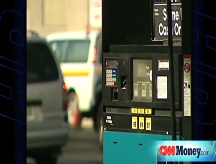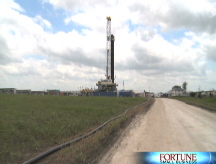Oil rallies in $5 turnaround
Threat of Nigerian oil workers' strike sends crude into volatile turnaround, despite mixed government report on inventories and Bush's calls for expanded production.

NEW YORK (CNNMoney.com) -- In a nearly $5 swing from its lows, crude prices ended sharply higher Wednesday following a report that Nigerian oil workers are threatening to go on strike.
U.S. crude for July delivery rose $2.67 to settle at $136.68 a barrel on the New York Mercantile Exchange. Oil traded as low as $131.82 shortly after the government released its weekly inventory report before starting the dramatic rebound in the afternoon.
The Associated Press reported that white-collar oil industry workers in Nigeria, Africa's largest oil producer and a major U.S. supplier, have threatened a strike against a Chevron Corp. (CVX, Fortune 500) unit.
The AP also reported that the main Nigerian militant group, blamed for attacks that have significantly cut Nigerian oil production in recent years, said it would not take part in a peace summit next month.
"Oil started its big turnaround on renewed worries about the Chevron situation," said MF Global energy analyst John Kilduff. "Reduced expectations on Saudi Arabia also helped."
Oil traders mulled a potential production increase by Saudi Arabia, the world's largest oil producer and a key OPEC member.
Saudi energy officials will host a summit of oil producing and consuming nations in Jeddah on Sunday to discuss ways to cope with soaring oil prices.
However, many analysts doubt that an increase in production from Saudi Arabia will be enough to satisfy soaring global demand. A push by President Bush Wednesday to permit more drilling for domestic oil only exacerbated fears that the Saudi plan will not go far enough.
President Bush called on Congress to pass legislation that would expand domestic oil production.
"In the short run, the American economy will continue to rely largely on oil. And that means we need to increase supply, especially here at home," Bush said Wednesday.
The outer continental shelf, an area that has been off limits to oil drilling because of environmental concerns, could provide 18 million barrels of oil, Bush said.
The president argued that technological improvements have made it possible to extract oil from the outer continental shelf without harming the environment.
"With these advances and a dramatic rise in oil prices, congressional restrictions on OCS exploration have become outdated and counterproductive," he said.
Bush also urged support for the expansion of oil production from oil shale, which he says has, "extraordinary potential."
The president also renewed his call to open protected areas of the Alaskan wilderness to oil exploitation.
"I urge members of Congress to allow this remote region to bring enormous benefits to the American people," he said.
Finally, Bush said the nation's refining capacity needs to be expanded and enhanced. He said delays in upgrading the nation's oil refineries has led refiners to import millions of barrels of fully refined gasoline from abroad.
"This imposes needless costs on American consumers. It deprives American workers of good jobs. And it needs to change," Bush said.
Congressional Democrats rejected Bush's call.
"Bottom line, you cannot drill yourself - ourselves to lower gas prices," said Rep. Nick Rahall, D-W.Va.
Rahall argued that Congress has opened more land to oil exploitation over the last several years and the price of gas has continued to rise.
"There is no correlation between opening up more pristine areas and lowering the price of gas. No correlation whatsoever," he said.
Rep. Edward Markey, D-Mass., went even further, criticizing the Bush administration for what he sees as its unfair bias in favor of the oil industry.
"The White House has become a ventriloquist for the oil and gas industry, repeating the requests of the oil and gas industry that they be allowed to destroy the most pristine areas of our country," Markey said.
In its weekly inventory report, the U.S. Energy Information Administration said crude stocks fell by 1.2 million barrels last week.
The decline, while marking the fifth straight week that crude stockpiles have shrunk, was less than the 2 million barrel drop analysts were expecting.
Gasoline supplies unexpectedly decreased by 1.2 million barrels. Analysts were looking for a 950,000 barrel increase in gas stockpiles, according to a poll by energy research firm Platts.
But distillates, used to make heating oil and diesel fuel, rose by 2.6 million barrels, exceeding estimates for a 1.8 million barrel rise.
Stephen Schork, energy analyst and publisher of the industry newsletter the Schork Report, thinks the market has been trading in a "consolidation range" since June 6 when the July contract surged nearly $11 to a record high near $139.12 a barrel.
Since then, oil prices have varied so widely and there has been "so much underlying support" for current prices, that moves of $1 or $2 are "just noise," Schork said.
Separately, retail gas prices eased for the second day in a row, according to a survey by motorist group AAA. The national average price for a gallon of regular gas fell to $4.075, down 0.3 cent from $4.078 the previous day. ![]()




